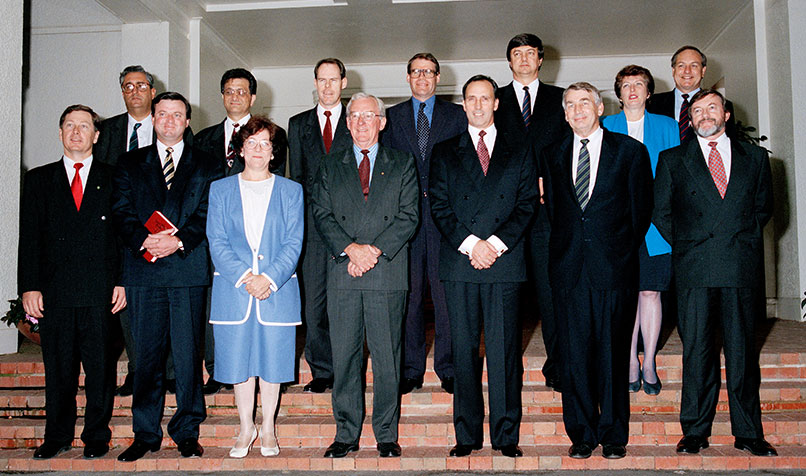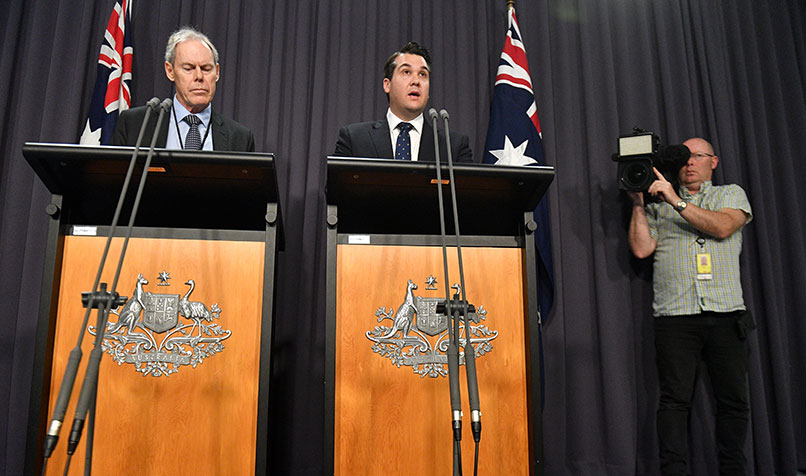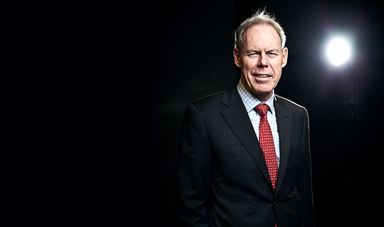Loading component...
At a glance
- As commissioner of the Australian Charities and Not-for-profits Commission (ACNC), Dr Gary Johns oversees some 57,000 charities on the ACNC Charity Register.
- His appointment in December 2017 followed a series of high-profile appointments, including many years as a minister in the Paul Keating government.
- Johns says he is driven by a desire to make Australia’s charity sector more transparent for donors, with the launch of what he calls a new “charity marketplace”.
By Johanna Leggatt
When Dr Gary Johns, former minister in the Keating government and penner of numerous controversial opinion pieces, was appointed commissioner of the Australian Charities and Not-for-profits Commission (ACNC), it ruffled a fair few feathers.
Johns’ views on the Australian charity sector at the time were well known. In addition to a number of media columns and essays, he had written a book called The Charity Ball: How to Dance to the Donors’ Tune, which argued that too many charities in Australia have been hobbled by activism, spend far too much time trying to influence government policy, and are lacking in transparency when outlining the disbursement of donor dollars.
When then-prime minister Malcolm Turnbull appointed Johns in December of 2017, some in the charity world were surprised that a “critic of the sector” could be tasked with helming it.
Johns maintains, however, that he is a fervent believer in the vital role that charities have to play in a society.
“I am actually not critical of the charity sector at all,” he tells INTHEBLACK.
“I have been critical of some charities and some spokespersons, many of whom are just ideologues and they should probably be in politics, not charities.”
The outrage did not surprise him, nor does he give it much thought.
“I have no regard for my critics… I’m motivated by the desire to make the charity sector more transparent,” he says.
Early labor leanings

In many respects, Johns had an ordinary 1950s Australian childhood. He grew up in what was then the working class suburb of Kensington, in Melbourne’s inner city, under the loving guidance of his house painter father and housewife mother, neither of whom discussed politics at the dinner table nor encouraged Johns to “follow his dreams”.
“Careers weren’t something that were encouraged in those days, you just got a job,” Johns recalls.
“It was a traditional family in that they provided shelter, love and care.”
When Johns was 15, he started to read newspapers, a seminal moment he describes, half-jokingly, as his downfall.
“I just wanted to know how the world worked, it was as simple as that,” he says.
“I read the paper all the way through, except for the sports section because I played sports, so I wasn’t wishing to read about it.”
Johns clearly had a deep interest in current affairs and politics, but cannot pinpoint where that passion came from.
“I didn’t even know university existed in high school,” he says.
Nevertheless, teachers encouraged him and other bright students to attend higher education, and he found his natural home in the Faculty of Economics and Politics at Melbourne’s Monash University.
“Studying gave me a sense of the world and a couple of ways to understand it,” he says.
“I joined the Australian Labor Party. Clearly, we wanted to make the world a better place and to see if our lot, working class people, could get a better go.”
Embracing practical economics
As Johns got older he began to read more widely, and saw the free market economy in a fresh light.
“You mature, hopefully, and by 1980 I had started to read editorials in The Australian Financial Review that transformed my view of the world,” he says.
The editorials he read spoke about the shimmering potential of free markets and the wealth they could create for everybody. It started to make sense to him.
By the time he moved into politics, taking on the role of assistant minister for industrial relations, and special minister of state during the Paul Keating era of Australian politics in the 1990s, he was sold on the importance of good economic stewardship.
“I was like a lot of [Bob] Hawke and [Paul] Keating party people coming through of that era who realised you had to grow the pie as well as divide it,” he says.
“I was mainstream New Labour, if you like. It was a pretty creative group and time.”
"I spend a lot of time visiting charities that are delivering real services to those in need on a daily basis, and I love it."
Politics also taught him about the great crush of demands upon MPs, of the various groups angling for government funds to bolster their respective causes.
A number of pivotal appointments deepened his experience: from 1997 to 2006, Johns was a senior fellow at the conservative think tank, the Institute of Public Affairs (IPA), where he was head of the Non-Government Organisations unit, and from 2002 to 2004, he was appointed associate commissioner of the Commonwealth Productivity Commission.
“I guess [my approach] is actually still old working class: it’s practical, it’s asking, ‘Is this actually going to work?’,” Johns says.
While acknowledging the need for change, Johns is conscious of not seeking to embrace change for change’s sake.
“It’s important to ask, ‘change of what?’,” he says. What about knowing what has worked in the past? What if your change makes things worse?”
Charity that works
That leads us straight to the heart of Johns’ concerns over the important function of a charity sector, and why he feels that – on occasion – the sector has tilted off course.
“Traditionally, charity was always built on a direct conversation between the charity and a donor on behalf of the beneficiary,” he says.
“Today, much of that conversation is built on an indirect relationship of charities talking to government, representing taxpayers, and the government uses its power to take taxpayers’ money, so the direct relationship is lost.”
Governments may want to keep various spokespeople happy, Johns notes, but these groups may not be “bearing sensible ideas, or they may be drifting from their purpose”.
Instead, Johns endorses charities that focus on delivering tangible and quantifiable benefits.
“I spend a lot of time visiting charities that are delivering real services to those in need on a daily basis, and I love it,” he says.
“They’re not thinking about the state of the world, or great ideologies; they want to help a particular group of people in need.”
Johns cites a recent example of a visit to the Orange Sky Laundry in Brisbane, started by “two young blokes under 30”, who operate mobile vans that provide laundry and shower facilities for the homeless.
“I went out with them and it’s just marvellous,” he says.
“They have more people volunteering than they can handle.”
Social enterprises, essentially businesses set up to fund a charitable cause, have great potential, “but they still have to explain themselves”, Johns notes.
“Is the enterprise trying to help a beneficiary and, if so, is it any better than an ordinary business that could be subsidised to hire someone who is otherwise unable to get into that market?” Johns says.
“I don’t automatically go for big, new, glossy baubles; just tell me if it works better than the alternative.”
Changing the system

Johns took over the ACNC role from the inaugural commissioner Susan Pascoe, whose team set up the first register of Australian charities, some 55,000 at the time, while establishing the ground rules for good practice.
Johns wants to build on Pascoe’s good work by making that register more transparent and easy for donors to research and navigate.
“The question every donor wants to know is, ‘How much will make it to the cause?’,” Johns says.
Johns spoke to a number of economists about how to create better transparency in the sector, and decided the best way is to have more information about how charities are spending money through a new “charity marketplace”.
“I’ve gone for a sort of middle level of accountability, and it’s called visibility,” he says.
“We concentrate on the quality of the information.”
From July this year, when charities fill out their ACNC Annual Information Statement, they will need to detail what their programs are, who they’re doing it for, and where they’re being delivered.
“At the moment we ask, what’s your principal activity, who is it for, and where do you do it, but it tells me nothing,” he says.
Instead, Johns decided to start asking more detailed questions about programs, mirroring the very language that charities use to describe their work.
“We want charities to tell us about their programs, because that is what lights them up,” he says.
“There is no point comparing across sectors, as that is too difficult, but if we can compare like for like through information on programs, it can bring us some understanding.”
In a year’s time, the aim is for donors to be able to search via programs that they may be interested in supporting.
“Right now on the online register, you can search for a charity, but you can’t search for a charity doing similar work,” Johns says.
“Yet with the new model, the chance of a small charity being found is as large as a big charity, as people will be searching via programs and that will really open up that marketplace.”
"My job is to make more visible the source of charities' incomes and what they do with it."
How will people know which charity or program is best?
“That is a question I will never answer, never attempt to answer, and I don’t think governments will go near it,” he says, “but at least you have lowered the price of searching for good information to zero.”
In fact, Johns sees the ACNC’s charity marketplace as similar in its approach to that of the Australian Bureau of Statistics.
“I want it to be like the bureau of stats in the sense that we should be known for the accuracy of the data, and it’s not our business to comment… you just publish that data,” Johns says.
“It’s then up to others – journalists, researchers, governments, and other charities – to have a look inside and see what is being offered in each place, for each cause.”
Johns, therefore, is unlikely to ever comment on where people should or should not give their money. When asked whether charities receive too much government money, a topic he has written about before, Johns says in the context of the new charity marketplace, it’s not a decision for him to make.
“That is the question for donors to decide,” he says.
“My job is to make more visible the source of charities’ incomes and what they do with it.”
In a final riposte to his critics, those who charge Johns with interfering in “their” sector, he is adamant that the sector belongs not to his critics, nor to him.
“There is an approach of, ‘This is our sector, leave us alone’,” he says.
“Well, it’s not your sector, it’s owned by hundreds of thousands of volunteers, beneficiaries, the general public, charity workers and employees, and millions of donors.”
Tips for success
Ask simple questions so you can communicate clearly to others.
Concentrate on one or two goals at a time.
Good reads
Economics and public policy
- The great escape: health, wealth and the origins of inequaliy by Angus Deaton
- Bourgeois dignity: why economics can't explain the modern world by Deirdre McCloskey
- The rational optimist: how prosperity evolves by Matt Ridley
- The better angels of our nature: a history of violence and humanity by Steven Pinker
Johns' awards and achievements
A PhD in political science in 2001 from the University of Queensland.
The Fulbright Professional Award in Australian-United States Alliance Studies, Georgetown University in Washington DC.
A Centenary Medal in 2001 for service to Australian society through the advancement of economic, social and political issues.
Author or editor of nine books dealing with public policy.

